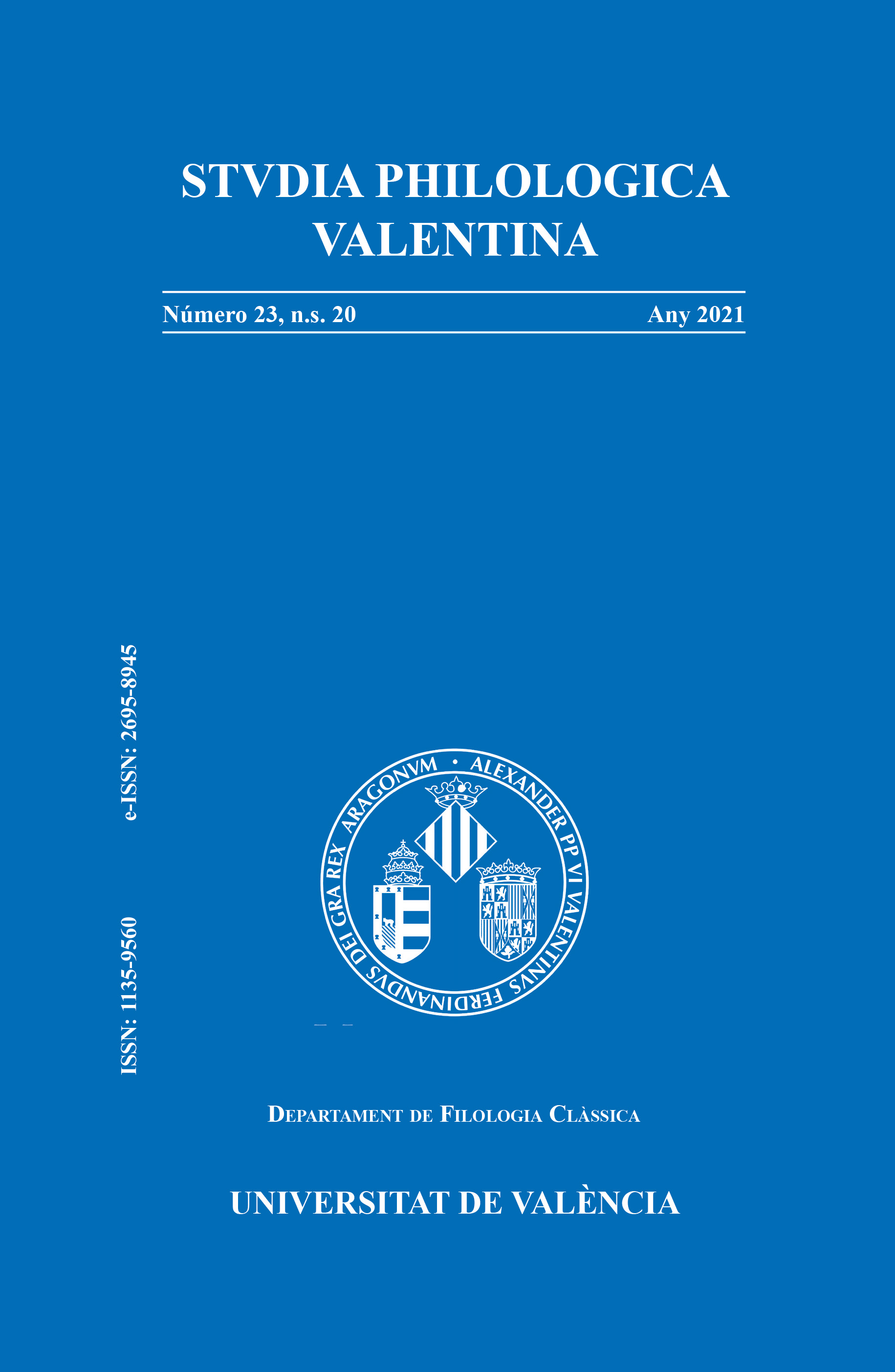La sacralité du pouvoir impérial à travers le corpus épistolographique de Démétrios Cydonès
DOI:
https://doi.org/10.7203/SPhV.23.21760Paraules clau:
Démétrios Cydonès, Byzance, autorité impériale, sacralité, Dieu Resum
Resum
Cet article présente le caractère sacré à partir duquel le pouvoir impérial doit être possédé, selon le penseur byzantin tardif Démétrios Cydonès. Les lettres de Cydonès montrent que l'empereur doit gouverner en tant que représentant de Dieu sur terre, ou plutôt cogouverner avec Dieu ses sujets et les affaires publiques. La victoire sur les ennemis aura l'approbation divine, tandis que les vertus de chaque monarque sont surveillées d'une certaine manière par Dieu lui-même. Bref, chaque souverain doit imiter Dieu dans sa vie et dans son gouvernement.
 Descàrregues
Descàrregues
 Referències
Referències
Éditions
Loenertz, R.-J. (1956/1960) (éd.), Demetrius Cydones, Correspondance, Tomes 1-2, Vatican.
Tinnefeld, F. (1981), Demetrios Kydones, Briefe, Teil I/1, Stuttgart.
Tinnefeld, F. (1982), Demetrios Kydones, Briefe, Teil I/2, Stuttgart.
Tinnefeld, F. (1991), Demetrios Kydones, Briefe, Teil II, Stuttgart.
Tinnefeld, F. (1999), Demetrios Kydones, Briefe, Teil III, Stuttgart.
Études
Angelov, D. (2007), Imperial Ideology and Political Thought in Byzantium, 1204-1330, Cambridge.
Barker, J.W. (1969), Manuel II Palaeologus (1391-1425): A Study in Late Byzantine Statesmanship, New Jersey.
Baus, K. (1985), Von der Urgemeinde zur frühchristlichen Großkirche, Handbuch der Kirchengeschichte, Tome I, Freiburg ‒ Basel ‒ Wien.
Blum, W. (1981), Byzantinische Fürstenspiegel: Agapetos, Theophylakt von Ochrid, Thomas Magister, Stuttgart.
Chaniotis, A. (2003), «The Divinity of Hellenistic Rulers», en A. Erskine (éd.), A Companion to the Hellenistic World, Oxford, 431-445.
Dagron, G. (1996), Empereur et pretre. Etude sur Je "cesaropapisme" byzantin. Paris.
Delacroix-Besnier, C. (1997), Les dominicains et la chrétienté grecque aux XlVe et XVe siècles, Rome.
Ganchou, T. (2002), «Démétrios Kydônès, les freres Chrysobergès et la Crète (1397-1401). De nouveaux documents», en C.A. Maltezou ‒ P. Schreiner (éds.), Bisanzio, Venezia e il mondo fancogeco, Venice, 435-493.
Glycofrydi-Leontsini, A. (2003), «Demetrius Cydones as a translator of Latin texts», en Ch. Dendrinos et alii (éds.), Porhyrogenita. Essays on the history and literature of Byzantium and the Latin East in honour of Julian Chrysostomides, Aldershot ‒ Burlington, 175-186.
Grünbart, M. (2005), Formen der Anrede im byzantinischen Brief vom 6. bis zum
12. Jahrhundert, Wien.
Hatlie, P. (1996), «Life and Artistry in the ‘Publication’ of Demetrios Kydones’ Letter Collection», Greek, Roman, and Byzantine Studies 37, 75-102.
Hunger, R. (1978), Die hochsprachliche profane Literatur der Byzantiner, t. I:
Philosophie - Rhetorik - Epistologaphie - Geschichtsschreibung – Geographie, München.
Kianka, F. (1981), Demetrius Kydones (c. 1324-1397): Intellectual and Diplomatic Relations between Byzantium and the West in the Fourteenth Century, New Work [PhD Dissertation].
Eadem, (1982), «Demetrius Cydones and Thomas Aquinas», Byzantion 52, 265-286.
Klauck, H.-J. (1998), Die antike Briefliteratur und das Neue Testament. Ein Lehrund Arbeitsbuch, Paderborn ‒ München ‒ Wien ‒ Zürich.
Laiou-Thomadakis, A.E. (1980), «Saints and Society in the Late Byzantine
Empire», en Charanis Studies: Essays in Honor of Peter Charanis, New Brunswick, 84-114.
Lilie, R.-J., (1994), Byzanz. Kaiser und Reich. Wien ‒ Köln.
Makris, G., (1993), «Zum literarischen Genus des Pulologos», en N. Panagiotakes (éd.), Origini della Letteratura Neogreca, vol. I, Venedig, 395-416.
Matschke, K.-P. ‒ Tinnefeld, F. (2001), Die Gesellschaft im späten Byzanz: Gruppen, Strukturen und Lebensformen, Köln ‒ Weimar ‒ Wien.
Mergiali-Sahas, S., (2001), «A Byzantine ambassador to the West and his office during the fourteenth and fifteenth centuries: a profile» Byzantinische Zeitschrift 94, 588-604.
Nicol, D.M. (1993), The last centuries of Byzantium, 1261 – 1453, Cambridge.
Podskalsky, G. (1977), Theologie und Philosophie in Byzanz, München.
Ryder, J.R. (2010), The Career and Writings of Demetrius Kydones. A Study of Fourteenth-Century Byzantine Politics, Religion and Society, Leiden ‒ Boston.
Tinnefeld, F. (2000), «Zur Entstehung von Briefsammlungen in der Palaiologenzeit», en C. Scholz ‒ G. Makris (éds.), ΠΟΛΥΠΛΕΥΡΟΣ ΝΟΥΣ Miscellanea für Peter Schreiner zu seinem 60. Geburtstag, München ‒ Leipzig, 365-381.
Todt, K.-P. (1991), Kaiser Johannes VI. Kantakuzenos und der Islam: politische
Realität und theologische Polemik im palaiologenzeitlichen Byzanz, Würzburg ‒ Altenberge.
Treitinger, O. (1956), Die oströmische Kaiser- und Reichsidee nach ihrer Gestaltung im höfischen Zeremoniell, Darmstadt.
Weiss, G. (1969), Joannes Kantakuzenos – Aristokrat, Staatsmann, Kaiser und Mönsch – in der Gesselschaftsentwicklung von Byzanz im 14. Jahrhundert, Wiesbaden.
Wessel, K. (1970), Die Kultur von Byzanz. Handbuch der Kulturgeschichte, Frankfrt am Main.
Zgoll, Ch. (2007), Heiligkeit - Ehre - Macht: ein Modell für den Wandel der Herrschaftskonzeption im Spätmittelalter am Beispiel der byzantinischen Kydonesbriefe, Köln ‒ Weimar ‒ Wien ‒ Böhlau.
Descàrregues
Publicades
Com citar
-
Resum240
-
PDF (Español)142
Número
Secció
Llicència
![]()
Aquesta obra està sota una llicència Creative Commons Reconocimiento-NoComercial-CompartirIgual 4.0 Internacional.



